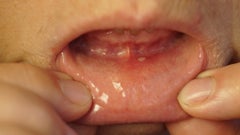
tizanidine
Tizanidine (Zanaflex) is a muscle relaxer used to treat stiff, rigid muscles. It's taken by mouth, typically 3 times a day. Tizanidine (Zanaflex) isn't a controlled substance, so it isn't known to cause an addiction. But it does have several risks and warnings for side effects such as low blood pressure, dry mouth, and sleepiness. Tizanidine (Zanaflex) comes as both brand and generic name tablets and capsules.

What is Tizanidine (Zanaflex)?
What is Tizanidine (Zanaflex) used for?
Muscle stiffness and rigidity
How Tizanidine (Zanaflex) works
Tizanidine (Zanaflex) is a type of muscle relaxer called an alpha-2 adrenergic receptor agonist. It works by slowing down nerves in your spinal column that control muscle tone. When those nerves slow down, your muscles relax.
Drug Facts
More on Tizanidine (Zanaflex) essentials

Get your GoodRx coupon

What are the side effects of Tizanidine (Zanaflex)?
Common Side Effects
- Dry mouth (49%)
- Sleepiness (48%)
- Weakness (41%)
- Dizziness (16%)
- Urinary tract infection (10%)
Other Side Effects
- Infections
- Constipation
- Vomiting
- Blurry vision
Serious Side Effects
- Allergic reaction: trouble breathing, itchy skin or rash, closing of the throat or swelling of the tongue
Source: DailyMed
More on Tizanidine (Zanaflex) side effects
The following side effects have also been reported
Along with its needed effects, a medicine may cause some unwanted effects. Although not all of these side effects may occur, if they do occur they may need medical attention.
Check with your doctor immediately if any of the following side effects occur:
More common
Chest pain or discomfort
fever or chills
nausea or vomiting
nervousness
pain or burning while urinating
unusual tiredness
Less common
Blurred vision
flu-like symptoms
irregular heartbeat
itching skin
right upper stomach tenderness
seeing things that are not there
shortness of breath
Incidence not known
Continuing vomiting
general feeling of tiredness or weakness
headache
light-colored stools
Get emergency help immediately if any of the following symptoms of overdose occur:
Symptoms of overdose
Blurred vision
change in consciousness
chest pain or discomfort
confusion
decreased awareness or responsiveness
difficult or troubled breathing
dizziness, faintness or lightheadedness when getting up from a lying position
irregular, fast or slow, or shallow breathing
lightheadedness, dizziness, or fainting
loss of consciousness
pale or blue lips, fingernails, or skin
severe sleepiness
sleepiness or unusual drowsiness
slow or irregular heartbeat
sweating
unusual tiredness or weakness
Some side effects may occur that usually do not need medical attention. These side effects may go away during treatment as your body adjusts to the medicine. Also, your health care professional may be able to tell you about ways to prevent or reduce some of these side effects. Check with your health care professional if any of the following side effects continue or are bothersome or if you have any questions about them:
More common
Dizziness or lightheadedness, especially when getting up from a lying or sitting position
drowsiness
sleepiness
weakness
Other side effects not listed may also occur in some patients. If you notice any other effects, check with your healthcare professional.
Call your doctor for medical advice about side effects. You may report side effects to the FDA at 1-800-FDA-1088.

Pros and cons of Tizanidine (Zanaflex)

Pros
Works very quickly
Available as a lower-cost generic
Capsules can be opened and sprinkled on applesauce
Can be taken only as needed
Multiple strengths available, so you can customize your dose easier

Cons
Taken multiple times a day
Stopping it suddenly can cause withdrawal symptoms, such as muscle rigidity and high blood pressure
Food can affect how well your body absorbs tizanidine (Zanaflex)
Not a good option for people with liver and kidney problems
Can cause dizziness, sleepiness, and low blood pressure as side effects

Pharmacist tips for Tizanidine (Zanaflex)

You can take tizanidine (Zanaflex) with or without food. But you should try to be consistent each time. This is because food causes your body to absorb the medication differently, which can affect how well this medication works and its side effects.
If you choose to take tizanidine (Zanaflex) with food, always take it within 30 minutes of a meal. If you choose to take tizanidine (Zanaflex) without food, always wait at least 3 hours after a meal to take your medication.
If your provider switched you from tizanidine (Zanaflex) tablets to capsules, be aware that you might notice some differences between how fast or how well the tablets and capsules work. If you take tizanidine (Zanaflex) tablets with food, you might feel their effects more quickly. But if you take tizanidine (Zanaflex) capsules, it can take longer before you experience their effects.
If you're having a hard time swallowing your tizanidine (Zanaflex) capsule, you can open it up and sprinkle the contents on applesauce. You will have to be consistent and always take the medication this way because the amount of tizanidine (Zanaflex) your body absorbs is different if it's sprinkled on applesauce than if you swallow the capsule whole.
If you have been on tizanidine (Zanaflex) for a long period of time, you shouldn't stop this medication suddenly. This can cause withdrawal symptoms, including high blood pressure, muscle spasticity, and a fast heartbeat. Talk to your provider if you want to stop taking tizanidine (Zanaflex). They will work with you to lower your dose safely.
Tizanidine (Zanaflex) can cause low blood pressure, especially if you change positions too quickly. This can cause you to get dizzy and fall. Whenever possible, try to stand up from sitting or lying down slowly and place your hands on a sturdy object while getting up.
Tell your healthcare provider about all the medications you're taking, including over-the-counter products. Tizanidine (Zanaflex) can interact with certain medications, including the antibiotic ciprofloxacin, and lead to very low blood pressure and a slow heartbeat.
Side effects like dizziness and sleepiness are common. Don't drink alcohol while taking tizanidine (Zanaflex), as it can make these side effects worse.
Tizanidine (Zanaflex) can affect your ability to focus and concentrate. Avoid driving or performing any activity that requires a lot of attention until you know how this medication affects you.
A common side effect of tizanidine (Zanaflex) is dry mouth. Chewing gum or sucking on ice can help with this. There are also special mouthwashes and lozenges available at your local pharmacy that can help.

Frequently asked questions about Tizanidine (Zanaflex)

How to save using GoodRx




What are the risks and warnings for Tizanidine (Zanaflex)?
Tizanidine (Zanaflex) can cause some serious health issues. This risk may be even higher for certain groups. If this worries you, talk to your doctor or pharmacist about other options.

Low blood pressure
Risk factors: Age 65 years or older | Taking blood pressure medications | Taking fluvoxamine or ciprofloxacin | Standing up from lying down quickly
Tizanidine (Zanaflex) can cause low blood pressure and dizziness, especially when you first start the medication and any time your provider raises your dose. Your provider will try to minimize these side effects by raising your dose slowly over time. To lower your risk of falls, make sure you stand up slowly from a lying position and use a sturdy object to help yourself up. If you continue to feel dizzy or unsteady, or if your blood pressure is too low, talk to your provider.

Extreme sleepiness
Risk factors: Taking with alcohol or illicit drugs | Taking other medications that cause drowsiness | People over 65
Taking tizanidine (Zanaflex) can make you feel sleepy and affect your concentration and focus. This is more likely to happen if you're over 65 or take other medications that cause drowsiness. Don't drink alcohol while taking this medication. Avoid activities that require you to be alert, like driving or operating machinery, until you know how the medication affects you.

Worsening drowsiness (from medication interactions)
There are certain medications that can interact with tizanidine (Zanaflex) and worsen low blood pressure and dizziness. For example, you're not recommended to take tizanidine (Zanaflex) along with clonidine (Catapress) or guanfacine. And you need to avoid taking tizanidine (Zanaflex) if you take either fluvoxamine (Luvox) or ciprofloxacin (Cipro).
Make sure to tell both your healthcare provider and your pharmacist about all medications and over-the-counter products you are taking before you start tizanidine (Zanaflex), even if you only take them once in a while or as needed.

Higher risk of tizanidine side effects (in people with kidney problems)
Risk factors: History of kidney problems
People who have kidney problems should be careful using tizanidine (Zanaflex). Tizanidine (Zanaflex) is processed by the kidneys, and if the kidneys aren't working properly, you could have a buildup of tizanidine (Zanaflex) in your body. This buildup can raise your risk of side effects like drowsiness and dizziness or make them more intense. If you have kidney problems, you will most likely be given lower doses of tizanidine (Zanaflex) to prevent these issues.

Liver damage
Risk factors: History of liver problems
Tizanidine (Zanaflex) can cause liver injury. If you have liver problems, you might not be able to take this medication. Or, your provider might ask you to get blood tests done regularly to check your liver health.

Hallucinations
A very small number of people have experienced hallucinations after starting tizanidine (Zanaflex). For most people, the hallucinations went away once they stopped taking the medication. Talk to your healthcare provider if this happens to you. There might be alternative muscle relaxers that are better options for you.

Withdrawal symptoms
Risk factors: Taking tizanidine (Zanaflex) for more than 9 weeks | Taking high doses of tizanidine (Zanaflex) | Also taking narcotic pain medications | Stopping tizanidine (Zanaflex) suddenly
If you stop taking tizanidine (Zanaflex) suddenly, you might experience withdrawal symptoms, including high blood pressure, a fast heartbeat, and muscle stiffness. This is more common if you've been taking a total of 20 mg to 36 mg per day for more than 9 weeks and then suddenly stop. It's also more likely to happen if you are taking both tizanidine (Zanaflex) and certain pain medications, such as oxycodone or morphine. Talk to your healthcare provider if you would like to stop taking tizanidine (Zanaflex). They can help you lower your dose safely.

Allergic reactions
Severe allergic reactions to tizanidine (Zanaflex) are possible, including life-threatening problems like anaphylaxis (closing of the throat). Call 911 if this happens. If you notice hives, a rash, swelling of the lips or tongue, or difficulty breathing after using tizanidine (Zanaflex), call your healthcare provider right away.

Tizanidine (Zanaflex) dosage forms
Typical dosing for Tizanidine (Zanaflex)
Adults: The typical starting dose is 2 mg by mouth every 6 to 8 hours, as needed (up to 3 doses a day). If needed, your provider might raise your dose every few days, up to a total of 36 mg per day.
Your dose might be different if you have liver or kidney problems.
More on Tizanidine (Zanaflex) dosage forms

Tizanidine (Zanaflex) Reviews
GoodRx has partnered with PatientsLikeMe to provide reviews on the different aspects of Tizanidine (Zanaflex).
Effectiveness
Learn more about the effectiveness of Tizanidine (Zanaflex) based on real life experiences.
Overall Rating
Based on 174 people taking this medication
2.7
Effectiveness by condition:
fibromyalgia142 reviews
3.0
multiple sclerosis16 reviews
1.9
hereditary spastic paraplegia6 reviews
1.5
insomnia5 reviews
4.5
primary lateral sclerosis5 reviews
2.5
Severity of side effects
Based on 763 people taking this medication
0%
50%
100%
Top side effects
Sleepiness
10%
Drowsiness
10%
Dry mouth
7%
Excessive daytime sleepiness (somnolence)
4%
Fatigue
4%
Reasons people stopped taking Tizanidine (Zanaflex)
Based on 551 people who have taken this medication
Did not seem to work
32%
Side effects too severe
20%
Doctor's advice
19%
Other
18%
Course of treatment ended
5%
Personal research
4%
Expense
4%
Change in health plan coverage
2%
How long people take Tizanidine (Zanaflex)
Based on 2067 people taking this medication
0%
50%
100%

Interactions between Tizanidine (Zanaflex) and other drugs
More on Tizanidine (Zanaflex) interactions
Using this medicine with any of the following medicines is not recommended. Your doctor may decide not to treat you with this medication or change some of the other medicines you take.
- Ciprofloxacin
- Fluvoxamine
- Viloxazine
Using this medicine with any of the following medicines is usually not recommended, but may be required in some cases. If both medicines are prescribed together, your doctor may change the dose or how often you use one or both of the medicines.
- Alfentanil
- Alprazolam
- Benzhydrocodone
- Bromazepam
- Buprenorphine
- Butorphanol
- Calcium Oxybate
- Cannabidiol
- Capmatinib
- Cetirizine
- Cimetidine
- Clozapine
- Codeine
- Deferasirox
- Desogestrel
- Dienogest
- Dihydrocodeine
- Doxylamine
- Drospirenone
- Esketamine
- Estradiol Valerate
- Ethinyl Estradiol
- Ethynodiol Diacetate
- Famotidine
- Fentanyl
- Flibanserin
- Gabapentin
- Gabapentin Enacarbil
- Gestodene
- Givosiran
- Glucagon
- Glycopyrrolate
- Glycopyrronium Tosylate
- Hydrocodone
- Hydromorphone
- Ketamine
- Lemborexant
- Levocetirizine
- Levonorgestrel
- Levorphanol
- Lofexidine
- Loxapine
- Magnesium Oxybate
- Meperidine
- Mestranol
- Methacholine
- Methadone
- Metoclopramide
- Mexiletine
- Midazolam
- Morphine
- Morphine Sulfate Liposome
- Nalbuphine
- Norethindrone
- Norfloxacin
- Norgestimate
- Norgestrel
- Ofloxacin
- Oxycodone
- Oxymorphone
- Peginterferon Alfa-2b
- Pentazocine
- Periciazine
- Pixantrone
- Ponesimod
- Potassium Oxybate
- Pregabalin
- Propafenone
- Quetiapine
- Remifentanil
- Remimazolam
- Revefenacin
- Rofecoxib
- Scopolamine
- Secretin Human
- Sodium Oxybate
- Sufentanil
- Tapentadol
- Ticlopidine
- Tiotropium
- Tramadol
- Trazodone
- Vemurafenib
- Verapamil
- Voclosporin
- Zileuton
- Zolpidem
Using this medicine with any of the following medicines may cause an increased risk of certain side effects, but using both drugs may be the best treatment for you. If both medicines are prescribed together, your doctor may change the dose or how often you use one or both of the medicines.

How much does Tizanidine (Zanaflex) cost?

Tizanidine (Zanaflex) contraindications
Taking with medications that raise the level of tizanidine (Zanaflex) in your body (strong CYP1A2 inhibitors), such as fluvoxamine (Luvox) or ciprofloxacin (Cipro)

What are alternatives to Tizanidine (Zanaflex)?
Muscle discomfort caused by acute (not long-term) conditions
Muscle spasms from multiple sclerosis or spinal cord injuries in people ages 12 years and older

What is the latest news about Tizanidine (Zanaflex)?

Tizanidine (Zanaflex) images
Get savings updates for Tizanidine (Zanaflex)
Receive price alerts, news, and other messages from GoodRx about Tizanidine (Zanaflex) and other healthcare topics and relevant savings offers.By providing your email, you consent to receive marketing communications from GoodRx, which may include content and/or data related to men’s health, women's health, reproductive care, or sexual health. You agree to the GoodRx Terms of Use and acknowledge the Privacy Policy. You can unsubscribe at any time.
References
Best studies we foundAlembic Pharmaceuticals Limited. (2023). Tizanidine hydrochloride capsule [package insert]. DailyMed.
American Heart Association. (2023). Low blood pressure - When blood pressure is too low.
Ascend Laboratories, LLC. (2023). Tizanidine tablet [package insert]. DailyMed.
Chaugai, S., et al. (2019). Co-prescription of strong CYP1A2 inhibitors and the risk of tizanidine-associated hypotension: A retrospective cohort study. Clinical Pharmacology and Therapeutics.
National Institute of Neurological Disorders and Stroke. (n.d.). Glossary of Neurological Terms.
See, S., et al. (2008). Choosing a skeletal muscle relaxant. American Family Physician.
Tanaka, H., et al. (2004). Effects of tizanidine for refractory sleep disturbance in disabled children with spastic quadriplegia. No to Hattatsu [Brain and Development].
Compare other Spasticity drugs
Browse medications
View AllResearch prescriptions and over-the-counter medications from A to Z, compare drug prices, and start saving.



















